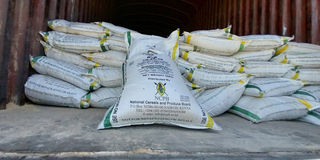Premium
Fake fertiliser: Controversy hits compensation scheme

Some of the 560 bags of substandard fertiliser that were seized at the National Cereals and Produce Board depot in Molo, Nakuru County on March 23, 2024.
Controversy raged yesterday over compensation of farmers for substandard fertiliser under the subsidy programme after the National Assembly Agriculture committee demanded to know where the funds will be sourced.
According to committee members, Sh12 billion had been allocated for the subsidy fertiliser programme and wondered where the government would get money to reimburse farmers.
"Our concern is to know the source of money for compensation since we appropriated Sh12 billion for the subsidy programme. Where are they getting the money," wondered Soy MP David Kiplagat, a member of the committee during a meeting with famers at the Kitale national Cereals and Produce Board depot.
The team is conducting public hearings on distribution of the below par farm input in NCPB depots in western Kenya. They held talks with farmers in maize growing zones of Trans Nzoia and Uasin Gishu.
Also Read: Fertiliser scam - Boni Khalwale tells President Ruto to fire Agriculture CS Mithika Linturi
Kwanza MP Ferdinand Wanyonyi, who is also a member of the committee, said they will recommend harsh penalties on individuals and companies found culpable in the fertiliser scam.
“The NCPB needs to put in place proper structures including installing laboratories at all depots, to guarantee quality of the fertiliser they receive to stop being used as dumping ground for counterfeit products,” said Mr Wanyonyi.
The NCPB has initiated compensation process for farmers who bought poor quality fertiliser to avert huge losses. The board has directed all farmers who bought KEL fertiliser to lodge formal complaints by filling a claim declaration form that will be provided at the depot or selling centre where they purchased the input to facilitate compensation.
They are required to present their original national identity cards and evidence of purchase including exhibits for farmers who have not used the fertiliser.
“All farmers who have utilised the fertilisers and NCPB has verified that they procured from their stores, will be issued with an equivalent amount of the top-dressing fertiliser. In the case of farmers who procured and have not utilised the fertiliser, they will be required to return the product to NCPB stores and be issued with equivalent amount of planting fertiliser. Farmers’ documentation must match with the existing records at NCPB’s silos or depots in the mezzanine system,” said a statement by Titus Maiyo, the NCPB corporate communications manager.
The move follows a directive from the Ministry of Agriculture and Livestock Development that all farmers who bought KEL fertilisers be compensated.
The board has so far distributed three million bags of planting and 300,000 top dressing fertiliser bags for the 2024 long rains season to registered farmers under the State subsidy programme.
KEL Chemicals, which was recently linked to the saga has opposed compensations plans saying that NCPDB was rushing to do so even before investigations are completed and the source of the bad planting material established.
The KEL chief executive officer Devesh Patel has since disassociated itself with the exercise.
“We have not been involved in the planned exercise, nor have we provided resources for the same. We maintain the position that the impugned fertilisers did not originate from us,” the statement read.
It said the plan to compensate farmers raises more questions, including the source of funds.
According to the company, it only manufactured and delivered 69,670 bags of NPK 10:26:10 to Mems Distributors Limited stores in accordance with their contract.
“Where did NCPB and Mems Distributors Limited secure all those extra bags that they distributed to farmers?” asked KEL.
The firm has challenged NCPB to explain to the public the basis of its compensation plan noting that any attempt to paint it as the purveyor of the faker fertiliser will be met with legal action.





